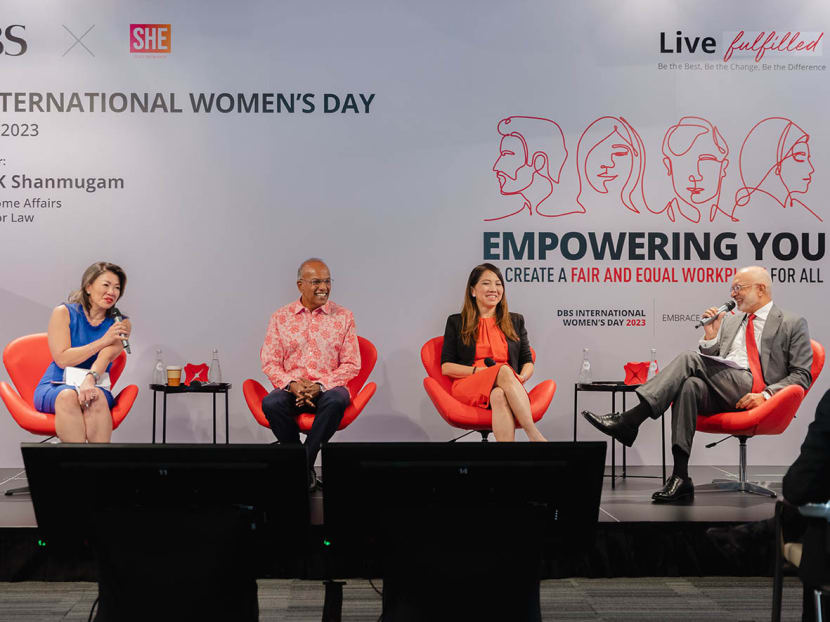Use quotas to boost women board members? DBS boss, female lawyer and Shanmugam give differing views in forum
SINGAPORE — The vexed question of implementing quotas to boost the number of women in Singapore boardrooms prompted some sharply differing views at a panel discussion on inclusive workplaces on Tuesday (March 14).

From left: Ms Stefanie Yuen Thio, chairperson of SG Her Empowerment, Law and Home Affairs Minister K Shanmugam, Ms Tan Su Shan, group head of institutional banking at DBS, and Mr Piyush Gupta, chief executive officer of DBS.
- DBS bank's CEO Piyush Gupta suggested implementing quotas for women in board positions, at a panel discussion on inclusive workplaces
- To this, moderator and women's activist Stefanie Yuen Thio said that "there is nothing worse you can do for women’s empowerment”
- The panel discussion was organised to mark International Women’s Day
- It featured two other speakers, Law and Home Affairs Minister K Shanmugam and the bank’s group head of institutional banking, Ms Tan Su Shan
- How women can gain confidence in their workplace was also another issue that was tackled by the panellists
SINGAPORE — The vexed question of implementing quotas to boost the number of women in Singapore boardrooms prompted some sharply differing views at a panel discussion on inclusive workplaces on Tuesday (March 14).
When asked what organisations can do to build inclusive workplaces, one of the panellists, DBS bank's chief executive officer Piyush Gupta, suggested implementing positive discrimination or quotas.
He said that the idea came up during the early years when he sat as a board member.
“I was of the view that we need a quota because Singapore’s percentage of women on boards is abysmally low. And I said, maybe for a short time, we need to have a lot of positive discrimination, like a quota.”
He added that he found it interesting that most of the women on the board resisted the idea.
“There is nothing worse you can do for women’s empowerment than putting a quota. Because there are people who will look at me on the board — and I serve on a board — and they will look at me and say she’s just there because she has two X chromosomes.Discussion moderator Stefanie Yuen Thio, who is also the founder of non-profit for girls and women, SG Her Empowerment”
The moderator of the discussion, Ms Stefanie Yuen Thio, who is also the founder of SG Her Empowerment, a non-profit for girls and women, and who is joint managing partner of TSMP Law Corporation, was firmly against quotas.
“There is nothing worse you can do for women’s empowerment than putting a quota. Because there are people who will look at me on the board — and I serve on a board — and they will look at me and say she’s just there because she has two X chromosomes,” she said.
The event was hosted by DBS and held to mark International Women’s Day, which fell on March 8.
A report released earlier this month said that women made up 21.5 per cent of board directors at the top 100 companies listed on the Singapore Exchange, national daily The Straits Times reported.
The event also featured two other panellists, Law and Home Affairs Minister K Shanmugam and Ms Tan Su Shan, group head of institutional banking at DBS.
Mr Shanmugam agreed with Mr Gupta on implementing quotas to move the needle on gender equity in the workplace.“I was involved in this debate for a while. I was in favour, from the Government’s side, of imposing a quota, because the numbers were not moving at all," he said.
“But we did it in a typically Singaporean way. We didn’t put it in the legislation, but the Monetary Authority of Singapore introduced various guidelines. And everybody took note and, you know, friendly conversations. And things started changing,” Mr Shanmugam added.
Ways that women can break the glass ceiling and assert themselves in male-dominated spaces also came up during the panel discussion.
Ms Tan spoke about her early experiences in her career as a trader in New York in the United States during the 1990s, which was “almost entirely male-dominated”.
“I think the subconscious bias in those days was you had to be a man to make it in the trading room. And therefore, if you’re a woman, it didn’t matter how good you were. There was a subconscious bias that you’re not going to be as good as the guys," she said.
“I learned to have a good attitude, to be agile and accountable for your own career path," Ms Tan added.
"The attitude matters, especially a resilient attitude. If they (the men) throw something at you, throw it back. Throw it back with gusto, whether it’s a curveball or a joke. Take it in your stride. Don’t go to the bathroom and cry.”
WHAT IS NEEDED TO EMPOWER WOMEN IN THE WORKPLACE
One of the questions the audience posed to the panellists was about how women can build confidence in the workplace.
Mr Gupta responded that putting oneself in public-speaking situations and receiving mentorship are some ways, which is why he encourages people to create a network.
However, Ms Thio said that a mentorship would be a difficult option for a mid-level career woman if a large proportion, if not all, of the mentors are men.
“If I’m always seen to be cosying up to these mentors, people are going to say I’m sleeping my way to the top. So maybe what works for a male looking for a male mentor might not work for a woman looking for a mentor,” she added.
Another question posed was on how junior employees can feel comfortable enough to speak up against discriminatory practices, which may have significant repercussions for workers in low positions.
This goes back to the organisation’s leadership and capacity to set the right culture, Mr Shanmugam said.
“You need to set the culture right from the top leadership. And you need to have the reporting mechanisms protecting the whistleblower.
"And in today’s world, I think anyone running modern organisations should be aware of these things, whether it’s in the public or private sector,” he added.
At the event, Mr Shanmugam announced that DBS will be launching a seven-month Women’s Leadership Programme from April, which provides support network opportunities for high potential young women leaders in the bank.
There is also the “SHE Sneak Peek” programme by SG Her Empowerment in collaboration with Standard Chartered Bank, where selected underprivileged young women will be given the opportunity to attend short placements in public, private and people sectors. This will be rolled out over a year.
He added that a good mix of 20 companies and organisations from various sectors have come on board, including DBS, Grab, Ernst & Young, Shein, SCDF, United Women of Singapore and TSMP Law Corporation.
CORRECTION: An earlier version of this article said women made up 36 per cent of board directors in the top 100 listed companies in 2022. This is incorrect. It should be 21.5 per cent. We are sorry for the error.











